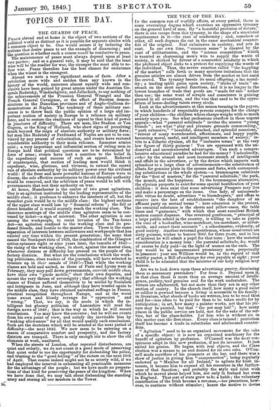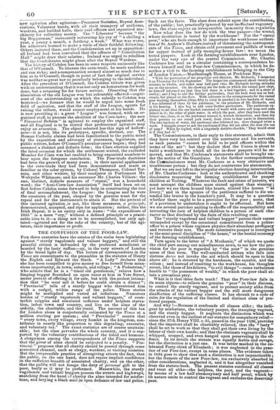THE VICE OF THE DAY.
IN the common run of worldly affairs, at every period, there is some overruling dogma which exercises an oppressive tyranny on the general herd of men. By "a beautiful provision of nature," there is one escape from this tyranny, in the shape of a simulated acquiescence in it—the cant of conformity ; and, somehow or other, all such dogmas die out in the same mechanical counter- feit of the original. Zeal culminates in zealotry, and sets in cant. In our own time, "common sense" is cheated by the cant of utilitarianism, and the "intense competition" which is vaunted as sharpening men's wits to supply the wants of society, is skirked by favour of a counterfeit assiduity in which the professed object sinks to a pretext for supplying the wants of the individual. Thus, the severe exaction called "the haggling of the market" calls forth so many spurious imitations that the genuine articles are almost driven from the market or lost amid the crowd. The tyranny breeds its usual offspring, a lax moral- ity; a trading spirit gains upon society, "tricks of trade" en- croach on the most sacred functions, and it is no longer in the lowest branches of trade that goods are "made for sale" rather then use ; the same want of scruple and conscience is gaining ground in all avocations, and the vice that used to be the oppro- brium of horse-dealing taints every circle. Look at the advertisements at this season teeming in the papers, in which hundreds of respectable persons compete for the charge of your children—the children whose charge weighs with so much anxiety upon you. See what professions overflow in these urgent appeals—what "parental solicitude" invites the unseen "young friends " ; see what "play and pleasure grounds commanding," "park extensive," "beautiful, detached, and splendid mansions," "retreat of many warmhearted, affectionate, and happy pupils, becoming moral, useful, and intelligent members of society," in- vite to a didactic elysium, all for "inclusive terms" at the very low figure of thirty guineas ! You are oppressed with the un. deserved and unremunerated advantages. Can such a compre- hensive educational paradise be had for the money? Undoubtedly, either by the utmost and most incessant stretch of intelligence and effort in the advertiser, or by the device which imparts such splendour to a large class of advertisements—the substitution of albata for genuine plate in the spoons and forks, with correspond- ing substitutions in the whole system—a brummagem substitute for the "first of masters," for the "parental solicitude," the park, the morals, and the happiness. In the brummagem alternative, the elysium purports to exist for some special beatification of your children : it does exist that some advertising Prospero may live and make a percentage on the items. One lady, of unimpeach- able virtue no doubt, advertises "to linendrapers," and offers to receive into the best of establishments "the daughter of an affluent party on mutual terms" : here education is the pretext, the essential substance is the sheets and pillow-cases, the table linen and "garments," with which that most excellent British matron cannot dispense. One reverend gentleman, "principal of a large public school in the country, is willing to take as pupils the sons of a bookseller, wine-merchant, tea-merchant, or silver- smith, and outset their accounts " ; a schoolmaster, evidently, of good society. Another reverend gentleman, whose usual terms are sixty guineas, wishes to borrow 300/. for three years, and in lieu of interest he will admit a pupil for that term : here the material consideration is a money loan : the parental solicitude, &c. would of course be duly paid—in the light of usance on the cash. The boy would be an impersonated promissory note, perpetually in presence : your son William would be, in the regard of that worthy pastor, a Bill of exchange for ever payable at sight ; your child is to be educated that the minister of our holy religion may borrow.
Are we to look down upon these advertising gentry, dismissing them as mercenary pretenders? Far from it. Depend upon it, in that class there is more than an average amount of intellb gence, probity,'and genuine zeal for the work undertaken. The virtues are adulterated, but not more than they are in any other section of society. In the church itself, how many a good sailor or soldier is gowned because a living is accessible to his family ; in literature, what shoals of books are written, less to be read than paid for—leas often to be paid for than to be taken credit for by anticipation ; in art, how many a painter works, not that his pic- ture may be painted, but that "the pot may boil"; how many places in the public service are held, mot for the sake of the ser-
vice, but of the place-holder. Let him who is without sin in this matter cast the first stone. Every class is tainted : patriotism itself has become a trade in substitutes and adulterated counter- feits.
"Agitation " used to be an organized movement for the sake
of a specific object : it is now an organized machinery for the benefit of agitators by profession. O'Connell was the most con- spicuous adept in this new profession, if not its inventor. It just suited his genius. He began with real objects, and the Clare election was a means to an end desired for its own sake. O'Con- nell made sacrifices of his prospects at the bar, and there was a show of justice in giving him "compensation"; being regularly endowed as " Member for all Ireland," to agitate for Irish in- terests, it became him to expend all his resources in the further- ance of that function ; and probably the style and éclat with which he moved about helped him, not only in Ireland but even in England. That sort of state grew to be a habit ; the voluntary' contribution of the Irish became a revenue,—too precarious, how- ever, to continue without stimulter, hence the motive to devise
new agitation after agitation—Precursor Societies, Repeal Asso- ciations, Volunteer bands, with all their trumpery of uniforms, wardens, and builded halls, their paid officers and organized ma- chinery for collecting money. The " Liberator" became " the big Beggarman," incessantly reiterating his cry of " a shilling a year, a penny a month, a farthing a week." What was worse, Lis adherents learned to make a trade of their faithful following. Others imitated them, and the Confederation set up in opposition : all Ireland had been convulsed that the officers of " Conciliation Hall" might draw their salaries ; Ireland was urged to rebellion that the Confederates might glean after the Repeal Wardens.
The history of Cobden has been in some respects ominously like that of O'Connell. To liberate the corn-trade, he made sacrifices and ran risks; and a compensation seemed almost as much due to him as to O'Connell, though in point of fact the original service was neither so great nor so peculiarly belonging to the individual. After the precedent of O'Connell, the Cobden tribute was given with an understanding that it was not only an honorarium for work done, but a retaining fee for future service. Observing that the dissolution of the old League was but colourably effected—cogni- zant of the understanding on which the subsidy to Cobden was beatowed—we foresaw that he would be urged into some fresh field of agitation, and that the staff of the League, agents for raising the tribute, would expect employment at his hands. He is now providing it : a great "League" was formed, with an or- ganized staff, to procure the abolition of the Corn-laws ; the new "Financial Reform" is agitated to employ the organized staff, and all England is to be stirred that professional agitators may enjoy an avocation. The object selected has this sign of hollow- ness—it is not, like its prototypes, specific, distinct, one. The Roman Catholic claims had been familiarized to the public mind by the exposition and advocacy of statesmen, legislators, and public writers, before O'Connell's peculiar career began ; they had assumed a distinct and definite form ; the Clare election supplied the fated occasion for which the settlement waited, the excluded Member for Clare was but enabled to bring organized numbers to bear upon the foregone conclusion. The Free-trade doctrines had been the growth of many years ; in their special application to the corn-trade they had been demonstrated and made as familiar as the solar system, by Colonel Thompson, Colonel Tor- rens, and other writers, by their coadjutor in Parliament Mr. Wolryche Whitmore, and his successor Mr. Charles Villiers : the one, distinct, definite measure of "repea]," was a household word ; the "Anti-Corn-law Association" itself had been set on foot before Cobden came forward to help in constructing the tool of final accomplishment, the League : the League and he were the creatures of the past, shaped by the genuine want for the repeal and for the instruments to attain it. But the pretext of this imitated agitation.is not, like those measures, a principle, demonstrated, accepted, and ripe for application ; rather, like the Irish Repeal, it is an entity only in name : "the expenditure of 1835" is a mere " cry," without a defined principle or a practi-
cable - cable idea to it—a thing not to be accomplished, but only agi- tated—agitated not for the sake of the country, but of the agi- tators, their importance or profit.



























 Previous page
Previous page